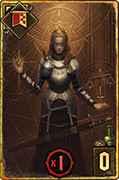
Basic Gameplay for Beginners
Welcome, Aretuza Novice, to our course Basic Gameplay for Beginners! The lessons in this course are aimed towards complete Gwent beginners. We will introduce you to the basic rules and card mechanics of Gwent. You will learn about rows, different types of cards, keywords and many other factors that make playing Gwent a unique experience. After completing this course, you will be able to play and understand Gwent, as well as move onto more detailed content that we have prepared for you in our other courses.
Contributors: Writing: lordgort & Easha Dustfeather; Review: SwanDive.
Introduction
In Gwent, there are three major types of cards: units, artifacts, and specials. This lesson will break down their similarities, their differences, and their uses.
You can tell which type a card is by looking in the top left corner. Units have a number, artefacts have a chalice symbol, and specials have a flame symbol.

Units
Units are the most commonly played cards in Gwent decks. There is even a minimum unit limit of 13, a deck with fewer units is invalid and can’t be used. Each unit takes up one space in one row.
Each unit has a starting point value, the white number in the top left corner, which contributes to your score for the round. Units can be boosted (the number turns green) to raise their point value or damaged (the number turns red) to lower it. When a unit is at zero points, it leaves the game board and goes to the graveyard (unless it is Doomed).

Units also have a wide variety of keywords, abilities and tags, which you can learn more about in other lessons and the Aretuza Glossary.
Artifacts
Like units, artifacts go on the game board when played and stay there until they're destroyed or the round ends. Unlike units, artifacts don't have a point value and can't be removed from the game board by damaging them.
Because artifacts don't contribute points to your score, they must have other effects to justify their inclusion in a deck. Some artifacts have an Order ability, like the one on Ale of the Ancestors; others need a certain trigger, such as Black Blood, or have a Deploy ability, like Portal.
Specials
Specials, like artifacts, do not have a point value. Unlike artefacts, they never take up space on the game board. Once you play a special, it does whatever its text says and then goes directly to the graveyard (unless it is Doomed).
Certain strategies revolve around special cards. One notable special card, Shupe's Day Off, even requires that you play only one copy of each card: No duplicates allowed!
Strategems

While only Tactical Advantage used to belong to this category, patch 5.0 Merchants of Ofir introduced new cards of that category. The player who has the disadvantage of going first starts with this card type and its Order ability which grants certain benefits as compensation. Once used, the card banishes itself from the board. Strategem is still a unique card type and the opponent is not meant to interact with it in any way. Therefore, the different category avoids such interactions with potential removal cards which only affect units, artefacts or specials.
Conclusion
Gwent's card types all have an important role to play. Units add points to your score. Artifacts stay on the game board and have useful effects. Specials provide a one-time effect that can change the course of a round. Strategems compensate for the disadvantage of going first with a one-time effect in Round 1.
Finding the right mix of units, artefacts, and specials plus choosing a Strategem is a crucial skill for building Gwent decks. Good luck on your path to mastery!

Author
Green Cricket
Green Cricket is one of the heads of Aretuza, creating an environment where players and content creators can thrive and continuously improve themselves. In addition to his work at Aretuza, he runs a Gwent YouTube channel for beginners and advanced players alike. He teaches how to become better at Gwent and offers one in-depth Gwent guide each week as inspiration.
